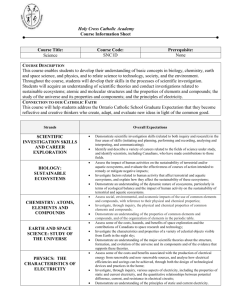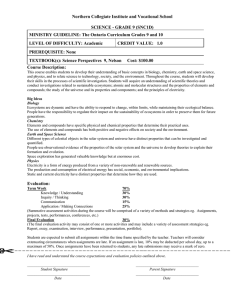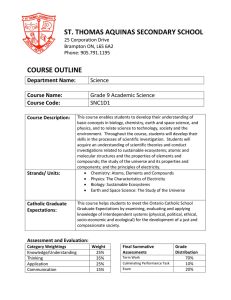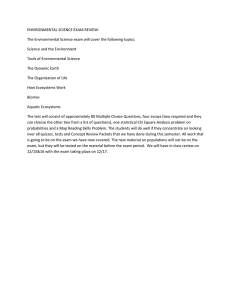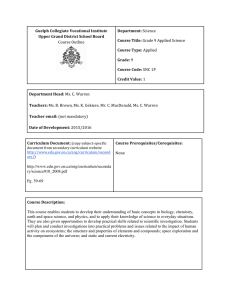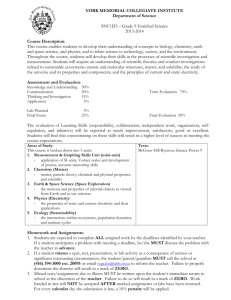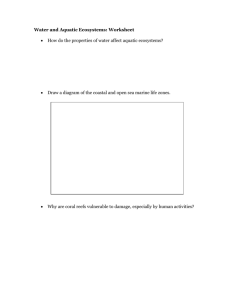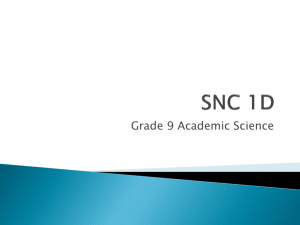Cardinal Leger Secondary School Science Department Course Overview:
advertisement
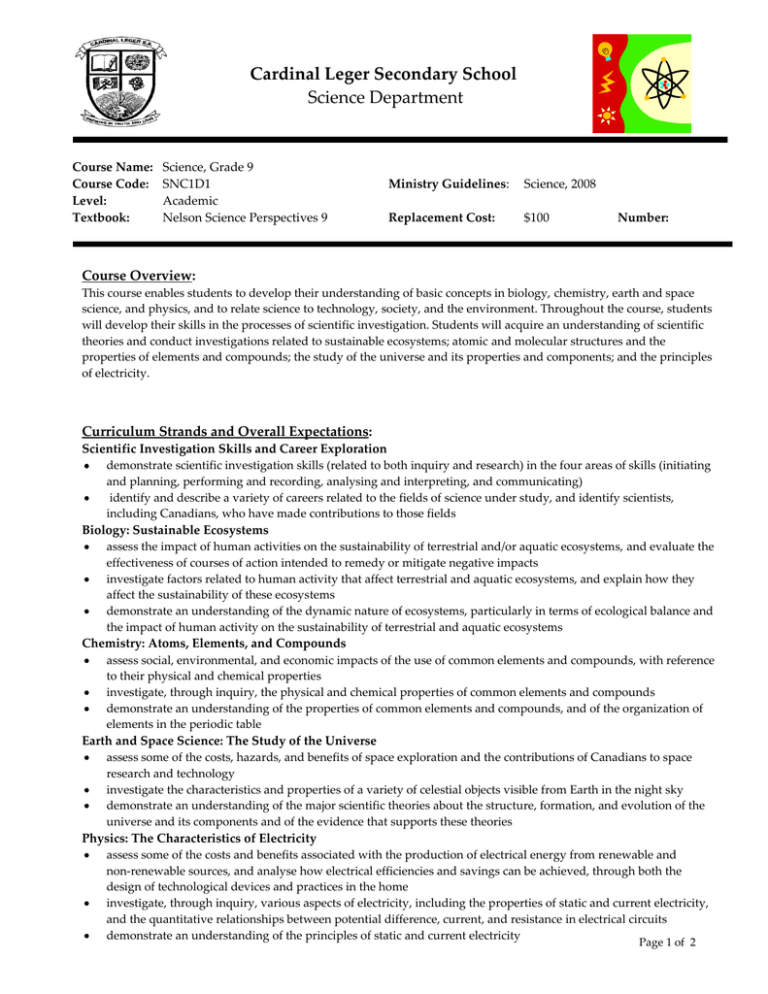
Cardinal Leger Secondary School Science Department Course Name: Course Code: Level: Textbook: Science, Grade 9 SNC1D1 Academic Nelson Science Perspectives 9 Ministry Guidelines: Science, 2008 Replacement Cost: $100 Number: Course Overview: This course enables students to develop their understanding of basic concepts in biology, chemistry, earth and space science, and physics, and to relate science to technology, society, and the environment. Throughout the course, students will develop their skills in the processes of scientific investigation. Students will acquire an understanding of scientific theories and conduct investigations related to sustainable ecosystems; atomic and molecular structures and the properties of elements and compounds; the study of the universe and its properties and components; and the principles of electricity. Curriculum Strands and Overall Expectations: Scientific Investigation Skills and Career Exploration demonstrate scientific investigation skills (related to both inquiry and research) in the four areas of skills (initiating and planning, performing and recording, analysing and interpreting, and communicating) identify and describe a variety of careers related to the fields of science under study, and identify scientists, including Canadians, who have made contributions to those fields Biology: Sustainable Ecosystems assess the impact of human activities on the sustainability of terrestrial and/or aquatic ecosystems, and evaluate the effectiveness of courses of action intended to remedy or mitigate negative impacts investigate factors related to human activity that affect terrestrial and aquatic ecosystems, and explain how they affect the sustainability of these ecosystems demonstrate an understanding of the dynamic nature of ecosystems, particularly in terms of ecological balance and the impact of human activity on the sustainability of terrestrial and aquatic ecosystems Chemistry: Atoms, Elements, and Compounds assess social, environmental, and economic impacts of the use of common elements and compounds, with reference to their physical and chemical properties investigate, through inquiry, the physical and chemical properties of common elements and compounds demonstrate an understanding of the properties of common elements and compounds, and of the organization of elements in the periodic table Earth and Space Science: The Study of the Universe assess some of the costs, hazards, and benefits of space exploration and the contributions of Canadians to space research and technology investigate the characteristics and properties of a variety of celestial objects visible from Earth in the night sky demonstrate an understanding of the major scientific theories about the structure, formation, and evolution of the universe and its components and of the evidence that supports these theories Physics: The Characteristics of Electricity assess some of the costs and benefits associated with the production of electrical energy from renewable and non‑renewable sources, and analyse how electrical efficiencies and savings can be achieved, through both the design of technological devices and practices in the home investigate, through inquiry, various aspects of electricity, including the properties of static and current electricity, and the quantitative relationships between potential difference, current, and resistance in electrical circuits demonstrate an understanding of the principles of static and current electricity Page 1 of 2 Cardinal Leger Secondary School Science Department Evaluation: Term Work 70% Knowledge and Understanding 25% Thinking 35% Communication 15% Application 25% Final Assessment 30% Formal Examination 20% Culminating Task 10% Course Total 100% Learning Skills and Work Habits Responsibility Organization Independent Work Collaboration Initiative Self-Regulation E= Excellent G=Good S=Satisfactory N= Needs Improvement Fulfills responsibility and commitments. Takes responsibility for and manages own behavior. Devises and follows a plan and process for completing tasks. Establishes priorities and manages time Independently monitors, assesses, and revises plans to complete tasks and meet goals. Uses class time to complete tasks. Accepts various roles and an equitable share of work in a group. Builds healthy peer-to-peer relationships. Looks for and acts on new ideas and opportunities. Approaches new tasks with a positive attitude. Sets own goals and monitors progress towards achieving them. Seeks clarification or assistance when needed. Missed/Late/Incomplete Assignments It is the student’s responsibility to address missed, late, or incomplete assignments. Students are expected to complete assignments and to adhere to assignment deadlines as follows: Due Date 10% Penalty Zone Closure Date A due date is set by the teacher. 1 school day late – 3% 2 school days late – 6% 3 school days late – 10% Maximum penalty of 10% Once the closure date has passed, work is considered incomplete and a mark of zero applies. Parent Signature: _______________________ Student Signature: ______________________ Page 2 of 2
